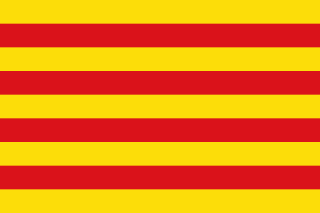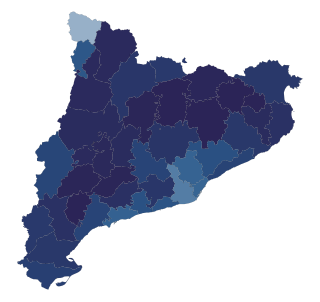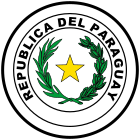
A referendum, plebiscite, or ballot measure is a direct vote by the electorate on a proposal, law, or political issue. A referendum may be either binding or advisory.

Catalan nationalism promotes the idea that the Catalan people form a distinct nation and national identity. A related term is Catalanism, which is more related to regionalism and tends to have a wider meaning, most people who define themselves as Catalanist do not necessarily identify as Catalan nationalists.
In the politics of the United States, the process of initiatives and referendums allow citizens of many U.S. states to place legislation on the ballot for a referendum or popular vote, either enacting new legislation, or voting down existing legislation. Citizens, or an organization, might start a popular initiative to gather a predetermined number of signatures to qualify the measure for the ballot. The measure is placed on the ballot for the referendum, or actual vote.

The Catalan independence movement is a social and political movement which seeks the independence of Catalonia from Spain.

A constitutional referendum was held in Spain on Wednesday, 6 December 1978, for approval or rejection of the proposed Spanish Constitution. The new constitution had been approved by the Cortes Generales on 31 October 1978, with the provision that the new law had to be approved by Spanish voters as well. The question asked was "Do you approve of the Constitution Bill?". The referendum resulted in 92% of valid votes in support of the bill on a turnout of 67%.
Same-sex marriage has been legal in Cuba since 27 September 2022 after a majority of voters approved the legalization of same-sex marriage in a referendum two days prior. The Constitution of Cuba prohibited same-sex marriage until 2019, and in May 2019 the government announced plans to legalize same-sex marriage. A draft family code containing provisions allowing same-sex couples to marry and adopt was approved by the National Assembly of People's Power on 21 December 2021. The text was under public consultation until 6 June 2022, and was approved by the Assembly on 22 July 2022. The measure was approved by two-thirds of voters in a referendum held on 25 September 2022. President Miguel Díaz-Canel signed the new family code into law on 26 September, and it took effect upon publication in the Official Gazette the following day.

The 2009 Washington Referendum 71 (R-71) was a state referendum that legalized domestic partnership in Washington state, the first statewide referendum in the United States that extended to LGBT people the rights and responsibility of domestic partnership. The bill had passed State Legislature, and it was signed into law by the Governor in May 2009, but opponents gathered enough signatures to put the measure before the voters, who returned ballots by mail over three weeks ending on November 3, 2009, approving the measure 53% to 47%. The new law went into effect 30 days later, on December 3, 2009.

The Puerto Rico statehood movement aims to make Puerto Rico a state of the United States. Puerto Rico is an unincorporated territorial possession of the United States acquired in 1898 following the Spanish–American War, making it "the oldest colony in the modern world". As of 2023, the population of Puerto Rico is 3.2 million, around half the average state population and higher than that of 19 U.S. states. Statehood is one of several competing options for the future political status of Puerto Rico, including: maintaining its current status, becoming fully independent, or becoming a freely associated state. Puerto Rico has held seven referendums on the topic since 1967, and four since 2012. They are non-binding, as the power to grant statehood lies with the US Congress.
The Statute of Autonomy of Catalonia of 2006 provides Catalonia's basic institutional regulations under the Spanish Constitution of 1978. It defines the rights and obligations of the citizens of Catalonia, the political institutions of the Catalan community, their competences and relations with the rest of Spain, and the financing of the Government of Catalonia.

The Ohio Collective Bargaining Limit Repeal appeared on the November 8, 2011 general election ballot in the state of Ohio as a veto referendum. Senate Bill 5 (SB5) was repealed by Ohio voters after a campaign by firefighters, police officers and teachers against the measure, which would have limited collective bargaining for public employees in the state. The formal title of the proposal that this measure nullified is Senate Bill 5. Among other provisions, SB 5 would have prevented unions from charging fair share dues to employees who opt out. The process to place the referendum on the ballot for voters to decide was completed by supporters, as signatures were certified by the Ohio Secretary of State. The group behind the referendum effort was the political action committee We Are Ohio.
Twelve national referendums were held in Switzerland during 2012. On 11 March, voters across the country were asked five questions on employment leave, second houses, building society savings, the Fixed Book Price Agreement and gambling revenues. On 17 June, there were three questions on healthcare, foreign policy and home buying. On 23 September, there were three on a smoking ban, secure housing in old age and music lessons at school. A final referendum was held on 25 November on the Animal Diseases Act.
A referendum on the political status of Puerto Rico was held in Puerto Rico on November 6, 2012. It was the fourth referendum on status to be held in Puerto Rico. Puerto Rico has been an unincorporated territory of the United States since the Spanish–American War in 1898.

Referendum 74 was a Washington state referendum to approve or reject the February 2012 bill that would legalize same-sex marriage in the state. On June 12, 2012, state officials announced that enough signatures in favor of the referendum had been submitted and scheduled the referendum to appear on the ballot in the November 6 general election. The law was upheld by voters in the November 6, 2012 election by a final margin of 7.4% and the result was certified on December 5.

A non-binding Catalan self-determination referendum, also known as the Citizen Participation Process on the Political Future of Catalonia, was held on Sunday, 9 November 2014, to gauge support on the political future of Catalonia. While also referred to as "Catalan independence referendum", the vote was rebranded as a "participation process" by the Government of Catalonia, after a "non-referendum popular consultation" on the same topic and for the same date had been suspended by the Constitutional Court of Spain.
A referendum is a direct vote in which an entire electorate is asked to either accept or reject a particular proposal. This article summarises referendum laws and practice in various countries.
Non-resident citizen voting is citizens voting in elections according to their citizenship while not residing in the country of the election. As of 2020 a total of 141 countries grant non-residents such as emigrants or expatriates the right to non-resident citizen voting. There is considerable variation across countries in regard to voter eligibility, voting modalities, i.e. voting in person at diplomatic missions or other physical locations, by post or online, which elections nonresident citizens may vote in, i.e. elections of the national legislature, executive elections, referendums, or sub-national elections, and how nonresident citizen voters are represented. The number of countries enfranchising nonresident citizens accelerated significantly in the 1990s. Social scientists have advanced a number of claims about the causes and consequences of this development and debated its normative implications or pros and cons of nonresident citizen voting.

An independence referendum was held on 1 October 2017 in the Spanish autonomous community of Catalonia, passed by the Parliament of Catalonia as the Law on the Referendum on Self-determination of Catalonia and called by the Generalitat de Catalunya. The referendum, known in the Spanish media by the numeronym 1-O, was declared unconstitutional on 7 September 2017 and suspended by the Constitutional Court of Spain after a request from the Spanish government, who declared it a breach of the Spanish Constitution. Additionally, in early September the High Court of Justice of Catalonia had issued orders to the police to try to prevent the unconstitutional referendum, including the detention of various persons responsible for its preparation. Due to alleged irregularities during the voting process, as well as the use of force by the National Police Corps and Civil Guard, international observers invited by the Generalitat declared that the referendum failed to meet the minimum international standards for elections.
A referendum on anti-corruption measures was held in Colombia on 26 August 2018. Voters were asked whether they approve of seven proposals aimed at reducing corruption: limiting the number of terms for politicians at all levels to three; requiring election candidates disclose their assets and those of their relatives; elected politicians being required to disclose their activities and private interests; a requirement for public hearings on budgets; a requirement for all public sector contracts to go out to tender; the removal of the right to parole for people convicted of corruption; and reducing the maximum salary of public officials and politicians from forty times the minimum wage to twenty-five times.
A constitutional referendum was held in Peru on 9 December 2018, alongside the second round of gubernatorial elections. Proposed by President Martín Vizcarra, the referendum aimed to tackle widespread political corruption in the country. The referendum sought public approval for four constitutional reforms: restructuring the National Council of the Magistracy, regulating political party financing, prohibiting the immediate re-election of parliamentarians, and reinstating a bicameral parliament.

The 2019 Uruguayan constitutional referendum, officially referred to as the referendum for constitutional reform on security matters, took place alongside general election of that year, on 27 October 2019, to ask the electorate whether a constitutional reform in public security should be approved. The proposed amendments to the Constitution would create a national guard, forbid early release for some serious crimes, introduce life sentences for crimes of rape, sexual abuse or homicide of minors as well as aggravated homicide of adults, and allow the police to conduct night raids. The referendum resulted in 46.8% of the votes cast in favor of amending the Constitution; however, not reaching the necessary 50%, the amendment was not approved, being rejected by 53.7% of the votes.











